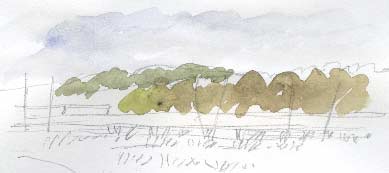 |
WildtrackTuesday, 7th May 2002, West Yorkshire |
![]()
![]()
![]()
![]() Rocks |
History |
Workshop |
Links |
Home Page
Rocks |
History |
Workshop |
Links |
Home Page
![]()
 The Strands, which I often refer to as 'the rushy field' in this diary, is a low-lying marshy pasture between the Calder and Hebble Navigation and the river at Horbury Bridge, west of Wakefield.
The Strands, which I often refer to as 'the rushy field' in this diary, is a low-lying marshy pasture between the Calder and Hebble Navigation and the river at Horbury Bridge, west of Wakefield.This morning I'm joined by Helen Mark of BBC Radio 4's Open Country as part of a programme they're recording about the Calder Valley. In between chatting this is as far as I get with my sketch (left) while Helen sketches the spiky rushes (right).
 When Gabi Fisher the producer decides she's got enough material for the 6 minute slot she asks us to stop talking for just 30 seconds to record some wildtrack; ambient background noise to use when editing the piece.
When Gabi Fisher the producer decides she's got enough material for the 6 minute slot she asks us to stop talking for just 30 seconds to record some wildtrack; ambient background noise to use when editing the piece.It's great to talk but it's surprising how much you hear when you stop for a few moments and just listen. There's hum of activity from local roads and farms but beneath that there's a softer whisper, the kind of thing you hear when you hold a seashell to your ear. It might in part be the river flowing in the background or the rustle of the breeze amongst the rushes.
Revealing one of the tricks of the trade David Attenborough recalled that to give the impression of total silence in his early wildlife films he used a slowed down recording of a waterfall.
Duff gen

 This kind of song flight is typical of a whitethroat (above, left and right) but when I glance at it with binoculars I can't see the white throat and I'm sure I can see an eye-stripe, which is absent in the whitethroat. The other possibility is that it's a sedge warbler (right), but it doesn't seem streaky enough, nor is its song very varied. It's not a willow warbler, by the way; that is one warbler I can distinguish.
This kind of song flight is typical of a whitethroat (above, left and right) but when I glance at it with binoculars I can't see the white throat and I'm sure I can see an eye-stripe, which is absent in the whitethroat. The other possibility is that it's a sedge warbler (right), but it doesn't seem streaky enough, nor is its song very varied. It's not a willow warbler, by the way; that is one warbler I can distinguish.Looking it up in the book I'm convinced that, despite appearances, it isn't a reed warbler. The reed warbler has a varied song and, as the name suggests, it usually sings from the cover of reeds.
Unfortunately during the interview I blurted out; 'Listen to that reed warbler singing its head off!'
I imagine all the messages that are going to come into the BBC pointing out the mistake and I e-mail the production team suggesting they cut out this comment, unless they'd like to make it this week's Open Country competition;
Which of our interviewees gave duff gen?Duff gen, is a term that comes into the board game Bill Oddie's Great Bird Race, where dubious information is given to encourage rival birdwatchers to go miles out of their way to spot a supposed rarity. For more information read chapters 4, 5 and 6 in Bill Oddie's Little Black Bird Book (Methuen, 1980) which include sections on 'Fooling the committee' and 'Brightening up a dull day'. Essential reading for any birdwatcher.
In an attempt to pin down the warbler I phone a friend, Eddie. He suggests I listen to the three species on a recording, but by now exact character of the song has slipped out of my mind. Next time I'll listen more carefully.
'Boggy and Sad'

In the interview I said; 'If we'd been sitting here in November 1999 we'd have been up to our ankles in water, the river burst its banks and flooded the entire field, connecting the river to the canal, so the field is safe from development.'
Eddie mentions in passing that he understands that a local firm will soon be ready to switch their mineral extraction operation to this field. I take a gloomy view of this - there are so few patches of rough wetland left - but Eddie suggests that in the long term it might well be restored as a superb wildlife habitat, like the site a few miles down the valley where sand and gravel extraction is just coming to an end. He's seen the firm's plans for that and they include lagoons overlooked by bird hides.
In A. A. Milne's Winnie-the-Pooh the doleful donkey Eeyore has his own 'gloomy place' which is described on the endpapers map as 'rather boggy and sad'. It's by the brook just upstream the 'floody place'. I must have a bit of Eeyore in me because I love this rushy field just the way it is and, for preference, I wouldn't wish it to be 'improved' with state of the art bird lagoons and hides.
Related Link
BBC Radio 4![]()
Richard Bell,
wildlife illustrator
E-mail; 'richard@willowisland.co.uk'
![]() Next page
Previous page |
This day in 2000 |
This month |
Nature Diary |
Home Page
Next page
Previous page |
This day in 2000 |
This month |
Nature Diary |
Home Page
![]()